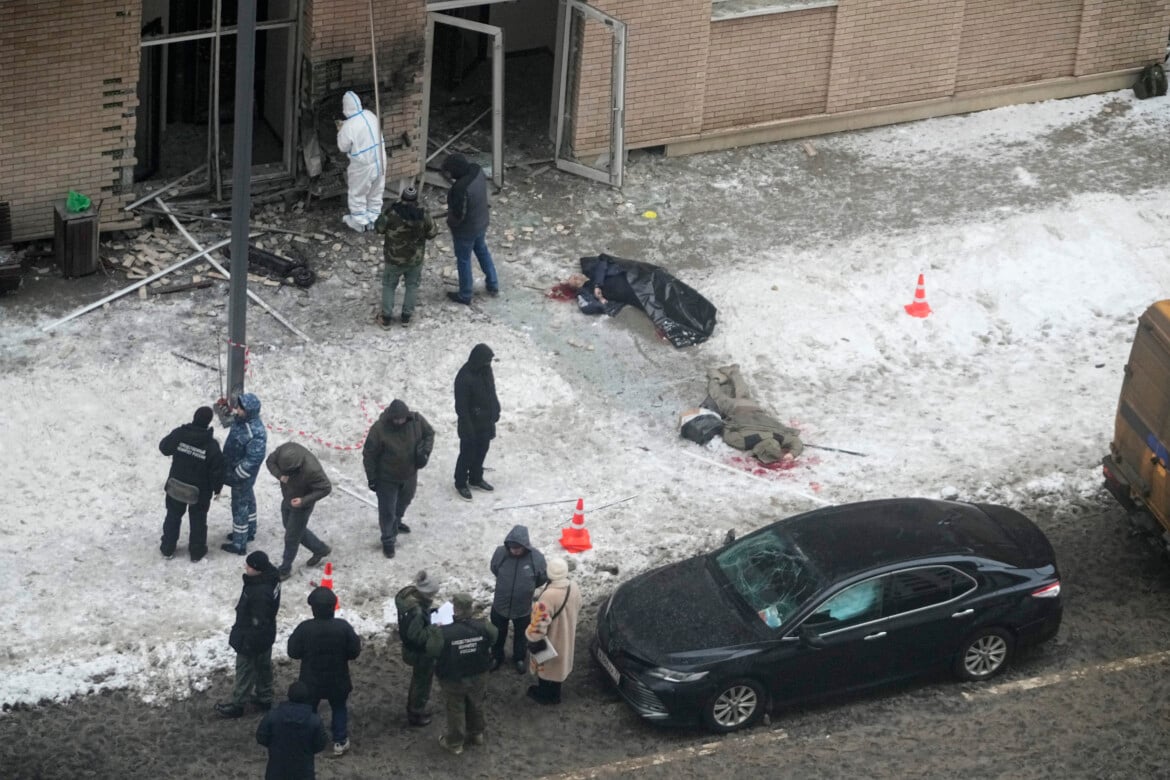Reportage
Convicted in absentia, Moscow’s chemical weapons boss was sentenced ‘Israeli-style’
If anyone asked Kirillov on Monday about his conviction by the Ukrainian court, he surely would have answered mockingly and with scornful confidence. However, the death sentence caught up with him in one of the places where he perhaps felt safest.

“Listen to that,” an overexcited man shouted, leaning against the small establishment’s wooden counter, “did you hear what happened over there?” Everyone laughed as the radio repeated the news yet again: “Russian General Igor Kirillov, 54, head of the Nuclear, Chemical and Biological Defense Troops of the Russian Armed Forces, was killed in an attack in Moscow around 6 a.m. this morning.”
“Slava Ukraini!” added one of the bystanders, and all in a chorus answered with the customary formula.
This is good news for the Ukrainians who are not fighting at the front: one of those events that makes one feel that one’s country is mighty and fearsome, even if things are not going too well on the battlefield. As the overexcited man shouted something to the effect of “everyone must end up the same as him!” we walked out of the small heated room toward the snowy banks of the Dnipro.
For the past few months, it has been a good idea to not be around when Ukrainian men are talking in out-of-the-way places: the nervous tension is palpable, and if it’s not absolutely necessary, it’s better to avoid the risk of being caught in the middle of something because you happen to be a journalist, a foreigner, lack faith in the country’s military victory or who knows what else. On Monday, Kirillov had been convicted in absentia by a Ukrainian court for “authorizing more than 4,800 uses of chemical weapons against soldiers and the civilian population.” Less than 24 hours after the court's verdict, the execution arrived, and with quite a splash. Some have called it “Israeli style,” meaning according to the strategies of open manhunt and defiance of all jurisdictions adopted by Mossad for decades after 1948.
Early in the morning, as was his custom, Igor Kirillov had just left his home on Ryazansky Prospekt in southeastern Moscow, on his way to the Defense Ministry. He was a public figure, both because of his constant TV appearances and because of the role he had taken up during the ongoing conflict: that of accusing Ukraine of a wide variety of misdeeds (he was one of the main figures who pushed the “secret U.S. chemical weapons laboratories hidden in Ukraine” narrative) and stirring up domestic public opinion against the enemy. He was also known to have taken part in the development of some weapons, such as the TOS-2 Tosochka heavy flamethrower. For these activities, he had been placed on the personal sanctions list by the United Kingdom. The Ukrainians blame him, among other things, for authorizing the use of chloropicrin, a toxic choking agent banned by international treaties.
If anyone asked Kirillov on Monday about his conviction by the Ukrainian court, he surely would have answered mockingly and with scornful confidence. However, the death sentence caught up with him in one of the places where he perhaps felt safest: outside the door of his residential building. A scooter parked nearby had been loaded with 300 grams of TNT and equipped with a remote detonator. When the general and his deputy passed in front of the scooter, the explosive charge was set off. It was a powerful explosion, sending bricks, pieces of nearby cars and road signs flying into the air. The two men died instantly.
Kyiv wasted no time and claimed the attack in the morning. “Kirillov was a war criminal and a legitimate target, as he gave orders to use banned chemical weapons against the Ukrainian military,” a Kyiv intelligence source (SBU) told the RBC news outlet. ”Such an ignominious end awaits all those who kill Ukrainians. Retribution for war crimes is inevitable.” The same source also disclosed that the whole operation was organized and implemented by the SBU. Obviously, such an operation cannot be organized overnight, so it is plausible to assume either that Monday's trial date (with the sentencing already decided) was suggested by the secret services, or that the mission had already been in place for some time. Putin's recent statements (and the trial) would have set off the plan for the immediate strike.
The reactions from the Russian side came with very harsh words. Medvedev, as usual, vowed “terrible and immediate revenge” against what he called “a regime of rogue neo-Nazis.” Foreign Ministry spokeswoman Maria Zakharova spoke of a “terrorist act” and insisted that Kirillov had led “heroic campaigns … denouncing the use of bacteriological weapons by NATO countries.” Nevertheless, condolences aside, Russian bloggers on social media raised a problem that has become too obvious to be ignored: “Whatever success we achieve on the battlefield, whatever euphoria takes hold when taking the initiative away from the enemy, the other side always has the ability to give us a painful sting.”
After the attack against regime ideologue Dugin which ended up killing his daughter, the one that took out blogger Tatarsky, and the two other recent (unclaimed) assassinations of military engineer Mikhail Shatsky and former Olenivka prison warden Sergei Yevsivkov, the killing of Kirillov is undoubtedly the hardest blow dealt by the Ukrainians to the Russians on their own soil.
Originally published at https://ilmanifesto.it/a-mosca-salta-in-aria-il-generale-kirillov-condanna-eseguita on 2024-12-18
